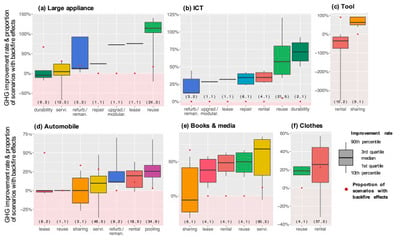Authors
Ryu Koide, Shinsuke Murakami, Keisuke Nansai
Abstract
The circular economy has potential synergies with climate change mitigation, although quantitative evidence for these synergies in the consumer product sector has not yet been systematically evaluated. We conducted a systematic review of existing studies of consumer-oriented product-service systems (PSS) on the lifecycle impacts, focusing on a meta-analysis of global warming potentials. Potential reductions in greenhouse gas emissions and the risk of backfire as a result of 10 types of circular economy strategies were investigated by reviewing 103 studies and more than 1500 scenarios for consumer durable and semi-durable products. As many as three-quarters of the reviewed studies analyse only one circular economy strategy rather than comparing (e.g., reusing, sharing, and renting) or integrating multiple strategies (e.g., leasing combined with remanufacturing). Approximately one-third of the reviewed studies rely on assumptions for set parameters of use, transport, and end-of-life phases, whereas more than half of the studies do not consider service and infrastructure provisions, or imperfect product substitution. Among the reviewed case studies, upgrading, repair, refurbishing, and pooling showed moderate to high improvement potentials with lower risks of backfiring, whereas servitisation, sharing, and reuse were associated with higher backfire risks, but they had high improvement potentials. The risk of backfiring was explained by factors such as transport, number of uses, product substitution and lifetime, maintenance, energy source, and energy efficiency. This meta-analysis revealed the importance of prioritising low-risk strategies, controlling for rebound effects of high-potential strategies, and integrating multiple strategies in order to utilize PSS for climate change mitigation.

You May Also Like
These Related Stories
